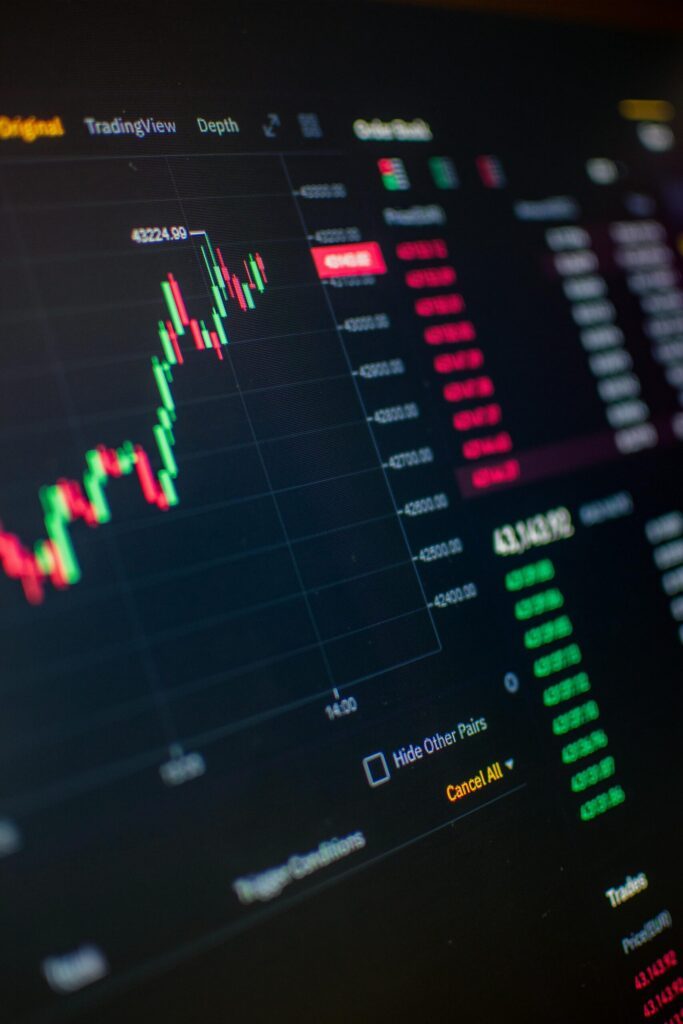In the fast-moving world of crypto, bitcoin leverage trading is like a two-way street. It can greatly increase your profits but also your risks. With this method, you can control more money than you actually have. On platforms like WhiteBIT, leverage ranges from 2x to 10x1. While this can be tempting, it’s important to be careful. Even small market changes can lead to big losses and might trigger a forced sell-off if the Maintenance Margin Fraction is breached1.
Given these risks, you need a smart plan and a good understanding of the market. This way, you can make the most of btc leverage trading‘s opportunities, despite its ups and downs.
Key Takeaways
- Leverage trading lets you handle bigger positions than your own capital would1.
- With more leverage comes more risk, so careful risk management and strategy updates are crucial1.
- Avoid making decisions based on fear or greed in the unpredictable crypto market12.
- Be aware of higher trading costs that could eat into your profits1.
- The rules for leverage trading vary by region, which can affect how you trade1.
- Different platforms offer various leverage ratios and fees, fitting various strategies and risk levels2.
The Fundamentals of Bitcoin Leverage Trading
Leverage trading in bitcoin helps intensify both gains and risks. It has become key for traders wanting to boost their market presence. Understanding how to trade bitcoin with leverage is important. You need to know its principles, market forces, and stats.
Bitcoin’s value soared close to 22%, reaching $51,500, driven by interest in U.S.-based spot ETFs. This shows the market’s excitement3. Leverage trading in bitcoin can greatly increase returns. Yet, leverage also means bigger losses if the market turns3.
Understanding the Concept of Leverage
Trading bitcoin with leverage lets you control more money than you invest. For instance, $500 could control $5,0004. This can lead to big profits or losses. The key is to manage this balance as leverage ratios vary4.
Exchanges offer different leverage ratios. Some are low like 2:1, while others go up to 100:1. These cater to various risk levels and strategies5.
Distinguishing Between Long and Short Trades
In leverage trading, you can go long or short. Going long means buying low to sell high. Going short is selling at the current price to buy back cheaper5. Leveraged trades are sensitive to market changes. They require smart decisions4.
The Balance Between Potential Profit and Risk
Effective leverage trading balances profit and risk. The CoinDesk Indices’ suggest a strong uptrend in the market3. Yet, there are risks, especially if bitcoin remains in a certain price range. Careful leverage choice and risk management are key3.
Traders should use strategies like stop-loss orders. This helps manage volatility and avoid losses from speculation34.
| Exchange | Maximum Leverage | Key Features | Fees |
|---|---|---|---|
| Binance | Up to 100x | Vast array of tokens, low fees | Competitive |
| FTX | Up to 101x | Creative financial products, low fees | Competitive |
| OKX | Up to 100x | Strong presence in Asian market | Comparable to Binance |
| ByBit | Up to 100x | Optimized for mobile trading | Higher than others |
| Delta Exchange | Up to 100x | Improving user experience, aiming to compete with bigger platforms | Competitive |
Different exchanges offer various features and fees for leverage trading4. Making informed decisions, using data, and managing risks are crucial for success in leverage trading.
Mastering Leverage Trading Mechanics
Learning to trade bitcoin with leverage is key in the risky world of margin trading. Margin acts as your trading foundation. It lets you trade bitcoin with more than you have, increasing both profits and risks. Bybit, for example, allows trading at up to 100x leverage, boosting the chance to make money but also risking more. This mix demands careful risk control and staying alert to market changes6.
Bybit stands out by offering access to over 1,000 cryptocurrencies for its 24 million users in 160 countries6. It introduces copy trading, where new traders can copy experts. This feature sorts expert traders by skill and sets profit shares, making starting in copy trading easy with just 50 USDT. Fees are low at 0.02%/0.055%6.
| Feature | Description | Impact on Trader |
|---|---|---|
| High Leverage Ratios | Up to 100x leverage on specific assets6 | Increased potential profits and risks |
| Copy Trading | Ability to replicate expert strategies6 | Access to expertise and reduced emotional bias |
| Profit-Sharing Ratios | Different tiers for master traders6 | Clearer investment outcomes and expectations |
| Adjustable Funding Intervals | Based on market volatility to aid in price stability6 | More balanced approach to perpetual contracts |
| Market Access via CFDs | Diverse asset trading without owning the underlying asset7 | Enhanced financial market exposure |
CFDs have made leverage trading more popular, offering new ways to profit from market ups and downs7. They allow for controlling larger market parts using leverage, aiming to increase returns. Yet this same leverage can lead to losses greater than initial bets when markets dive7.
Being good at leveraged CFD trading means you get market trends, use risk management, and keep learning. CFDs let you hedge, short sell, and navigate markets, tapping into their full potential7.
Responsible leverage trading is crucial. Traders must understand their risk tolerance, goals, and experience first. Wise traders take smart risks, learn continually, diversify, and work with trusted brokers. This increases their chances of success in the thrilling world of leverage trading7.
Advantages of Bitcoin Leverage Trading
Leverage in cryptocurrency trading has changed the game for traders. It lets traders borrow money to increase potential returns. This way, traders can do more with their own capital8. Leveraged bitcoin trading opens up new strategies and bigger profits for everyday investors.

Amplifying Gains with Controlled Investment
When you trade bitcoin with leverage, making careful investments is crucial. Leverage lets traders handle big positions with only a part of the trade’s actual value. This can lead to huge profits from small beginnings8. It shows how powerful leveraging can be in boosting financial results8.
Capital Efficiency and Diversifying Strategies
Bitcoin leverage trading is efficient because it requires less money to hold positions. This frees up funds for investing in different opportunities. This spreads the risk over more assets8. Also, leverage tokens, which follow certain tech protocols, can increase returns without needing complex management. An auto-rebalance keeps the leverage level right8.
Access to More Expensive Investment Instruments
Trading with leverage lets traders get into pricier investments without big capital. This adds flexibility to portfolios and helps in hedging against market swings. It protects from sudden price drops8. But, traders must be careful of the high risks and the challenge of choosing the right leverage8.
| Advantage | Benefit | Consideration |
|---|---|---|
| Amplified Potential Returns | Increase profits with a smaller initial investment | Risk of significant losses if market conditions change8 |
| Capital Efficiency | Less capital required for position maintenance | Additional fees may reduce overall profitability8 |
| Portfolio Diversification | Enables investment in a wider range of assets | Complexity in balance and rebalancing of leveraged tokens8 |
| Access to Expensive Instruments | Ability to trade high-value investments | Requires sophisticated risk management to avoid margin calls8 |
Key Considerations for Leveraged Positioning
Entering leverage bitcoin trading requires focus on three main aspects. First, you need a solid strategy. This is key to success in leveraged trading. Also, choosing the right leverage ratio is vital. It affects your potential gains or losses. Lastly, don’t forget about the fees. They can eat into your profits if you’re not careful.
Leveraged ETFs (LETFs) have an average expense ratio of 1.02%. This shows they are pricier than regular ETFs9. Their leverage ranges from 2:1 to 3:1. In contrast, normal ETFs have a 1:1 ratio9. Knowing the full costs of bitcoin trading leverage is crucial before starting.
Traders must also consider daily reset costs of LETFs. Over time, these can lead to unexpected returns9. The Direxion Daily Financial Bull 3x Shares (FAS) ETF, with a 0.96% expense ratio, aims for threefold returns. It shows the appeal of leveraged trading9.
| Global Trading Volume | Leverage Multiplies | Valuation in Blockchain | Market Capitalization |
|---|---|---|---|
| Over $60 trillion10 | Up to 100x on unregulated exchanges10 | $2.39 billion locked in Dai stablecoin system10 | $548 million in Dai’s governance token10 |
To effectively leverage bitcoin trading, know the big picture. The global equities market sees over $60 trillion traded yearly10. Crypto exchanges sometimes offer up to 100x leverage. This highlights the high risks in the crypto market10.
The Dai stablecoin system and its governance token show significant market interest. They have $2.39 billion in locked assets and a market cap of $548 million10. These numbers show the growth and interest in blockchain financial tools.
Fees for leveraged trades can include premiums and interest. Short selling fees might exceed 3% of the borrowed amount. This reduces profits from leveraged trades9. So, knowing these details is key for effective trading.
To master bitcoin trading leverage, detailed planning and execution are essential. Also, knowing the costs of leveraged instruments is crucial. With the right strategy and awareness, traders can make the most of leveraged trading.
Leverage and Its Impact on Crypto Market Volatility
The crypto market is known for its wild ups and downs. This draws in some investors but scares away others. Bitcoin trading with leverage magnifies both profits and losses. Even small price changes can greatly affect investment values. As Bitcoin’s worth climbs over $1 trillion11, leverage’s role in the market and its effect on investors become more critical.
Understanding Market Movements and Leverage Effects
Leverage can significantly shift market dynamics. A small change in crypto prices can lead to big percentage moves for those using btc trading with leverage. When the market cap for crypto hit about €2.5 trillion12, it showed how impactful leverage can be. With over 18,000 digital currencies by early 202213, traders need to stay sharp on market trends when leveraging.
Risks of Amplified Market Fluctuations
The dangers of huge market swings become clear when we see Bitcoin and other cryptos drop by over half in value since early November amid shifting conditions12. High leverage in crypto investments brings big risks. Even the most traded cryptos like Bitcoin, Ether, Litecoin, and Ripple (XRP)13 can see wild price swings.
As traders keep favoring bitcoin trading with leverage to increase potential profits, caution is advised. With Bitcoin being legal currency in El Salvador but few using it for taxes or debt11, the challenges of leveraging in a volatile market are clear. So, understanding leverage’s effects is key to navigating the crypto market’s rough waters.
Overcoming the Risks: Managing Your Leveraged Trades
The crypto world has grown massive, with its value hitting the trillions. There are thousands of cryptocurrencies, trading around the clock. This makes leveraging bitcoin trades both exciting and risky14. With major upsets like the FTX exchange crash14, it’s key to manage risks smartly. This includes setting stop-loss orders, managing how much you invest, and having a solid risk plan.
Setting Stop-Loss Orders to Limit Losses
Using stop-loss orders is essential when trading bitcoin with leverage. They auto-sell your investment if the price drops too much. This really helps when trading with high leverage, like x100. Just a 1% drop in price could mean losing it all15.
Position Sizing for Balanced Exposure
It’s wise to not put all your money in one trade. By carefully choosing how much to invest, you can avoid big losses. This was clear when terraUSD and LUNA crashed in May 202215. This strategy helps you stay in the game, even when markets are unpredictable.
Implementing a Solid Risk Management Plan
Having a good risk plan is vital for leveraged trading. It should include strategies like dollar-cost averaging and using derivatives for safety. It’s also about knowing the risks of where you keep your assets. FTX’s collapse in November 2022 showed the dangers of hacking and platform failures15. A good plan can help traders reduce risks and aim for profits.
With the crypto world being so complex and crowded14, and high fees being common, using advanced data analysis is crucial. The success of methods like the M-DQN shows how important it is to understand and apply these strategies. Below, you’ll find a table explaining some key risk management tactics and why they’re important.

| Risk Management Tactic | Rationale | Impact on Trading Outcome |
|---|---|---|
| Stop-Loss Orders | Automatically liquidates position at a predetermined level to contain losses | Prevents destructive account drawdowns from leveraged positions |
| Position Sizing | Allocates the proportionate amount of capital to each trade to prevent overexposure | Facilitates portfolio longevity and reduces risk of ruin |
| Risk Management Plan | A comprehensive framework including hedging strategies and portfolio diversification | Increases ability to handle adverse conditions and preserve capital |
With smart strategies and a deep understanding of crypto’s complexities1415, you can navigate leveraged bitcoin trading wisely and safely.
Choosing the Right Bitcoin Trading Platform with Leverage
Finding the best bitcoin trading platform with leverage is key for traders looking to grow their money. Different platforms offer leverage from 2x to a whopping 200x161718. This means big wins or big losses are possible. Beginners might like KuCoin or Crypto.com, with up to 10x leverage17. It’s safer yet still offers good profit chances.
Braver traders might try MEXC, which gives up to 200x leverage over 100 markets16.
Keeping your investments safe is crucial. Bybit and Kraken are trusted names. They keep your money secure with top-notch methods like cold storage16. They also meet important rules for money laundering, and terrorism financing prevention. For people in the U.S., Coinbase is a safe option. It follows strict SEC rules16.
| Platform | Max Leverage | Leverage on Spot Trading | Notable Security Features | Regulatory Compliance |
|---|---|---|---|---|
| MEXC | 200x | – | Continuous security monitoring | Yes |
| Bybit | 100x | 5x | Multi-signature cold wallets | Yes |
| Kraken | 5x | 5x on over 40 digital currencies | Continuous security monitoring | Yes |
| Coinbase | – | – | Adherence to SEC regulations | Yes |
| Phemex | 100x | – | Substantial welcome bonuses | Yes |
You can add funds to platforms in different ways, like crypto, bank transfers, or cards16. Each method has its own limits and fees. Easy funding makes the platforms more accessible to all. Margin trading can increase your earning potential but also your risk16.
Choosing a bitcoin trading platform with leverage is all about what you need. Consider leverage, funding options, security, and user experience. Being careful and well-informed can lead to success in crypto trading.
Detailed Analysis of Leveraged Tokens
Leveraged tokens are a great way for traders to get into leveraged trading bitcoin easily. They link the crypto world and complex trading methods. It’s crucial to explore these tokens’ workings before their availability changes.
ERC-20 and EVM-Compatible Protocols
These tokens use the ERC-20 standard, making them work with many wallets and exchanges. They fit well in the decentralized finance space. This means smooth trades and connections across various platforms, meeting the high demand for leveraged trading bitcoin.
Automatic Rebalancing Features and Implications
Leveraged tokens automatically adjust to keep their target exposure. This feature lowers the risk of liquidation when markets are unstable. It helps traders keep their leverage stable, even in volatile conditions.
The Trade-Off Between Convenience and Long-term Holding
Leveraged tokens make trading easier but come with downsides. They’re best for quick trades because long-term earnings can be affected by constant adjustments. If you’re thinking of keeping them longer, weigh their ease against possible outcomes.
Binance, a big name in crypto exchanges, is changing its leveraged tokens offerings. By February 28, 2024, they will stop trading and subscription services for these tokens19. They will also end delisting and redemption for specific pairs by April 3, 202419. Traders should act before these dates. The affected pairs are BNBUP/USDT, BNBDOWN/USDT, ETHUP/USDT, ETHDOWN/USDT, BTCUP/USDT, and BTCDOWN/USDT19.
After delisting, leveraged tokens will convert to USDT at their net asset value19. The USDT will be given to users within 24 hours. This crucial change means traders need to rethink their strategies.
| Token Pair | Delisting Date | Conversion Asset | Impact on Trading Strategy |
|---|---|---|---|
| BNBUP/USDT | April 3, 2024 | USDT | Short-term Strategy |
| BNBDOWN/USDT | April 3, 2024 | USDT | Short-term Strategy |
| ETHUP/USDT | April 3, 2024 | USDT | Short-term Strategy |
| ETHDOWN/USDT | April 3, 2024 | USDT | Short-term Strategy |
| BTCUP/USDT | April 3, 2024 | USDT | Short-term Strategy |
| BTCDOWN/USDT | April 3, 2024 | USDT | Short-term Strategy |
Leveraged tokens’ success relates to wider market movements. Binance had issues with DOWN tokens during a market crash on May 1920. Their leverage doesn’t stay the same but tries to hit a target range. This helps dodge issues that other leverage strategies can run into20.
Leveraged tokens bring chances and hurdles. They provide a way into leveraged trades with risk management. But, market shifts and demand changes affect them. As things change, traders need to keep up and adjust to stay ahead in leveraged trading bitcoin.
Demo Trade Bitcoin Leverage for Beginners
For aspiring traders, it’s crucial to understand the unpredictable nature of crypto markets. Learning to master leveraged derivatives like CFDs can open up profit opportunities and also increase risk21. It’s advised that beginners practice with demo accounts to demo trade bitcoin leverage safely before going live22.
Demo trading mimics real market conditions without the risk of losing money21. This setup helps you learn essential trading skills, like risk management using stop-loss orders. It’s especially helpful in understanding how leverage ratios affect the margin needed for trading2322.
Practicing in demo accounts boosts beginners’ confidence and skills21. These platforms introduce users to various trading tools and features. Here, beginners can learn how to leverage trade bitcoin. They start with smaller margins, increasing them as they grasp market movements22.
Leverage trading offers more buying power and access to investment chances. The table below shows the effects of leverage. It reveals increased purchasing power from a $1,000 investment at different leverage levels. This model also displays potential for account growth23.
| Leverage Ratio | Purchasing Power | Required Margin | Benefit |
|---|---|---|---|
| 10:1 | $10,000 | $1,000 | Investment Flexibility |
| 20:1 | $20,000 | $500 | Greater Market Exposure |
| 50:1 | $50,000 | Varies | Account Expansion |
Leveraged trading is risky but can also lead to big gains21. By starting with demo accounts, beginners can take a careful approach22. This helps build a strong knowledge base, lowering the chance of failure due to lack of experience22.
Real-Life Examples: Successes and Cautionary Tales
The btc trading with leverage world is full of ups and downs. Some people find great financial success, while others face tough lessons. It’s a place where victories bring financial independence. Yet, mistakes teach valuable lessons to all traders.
Stories of Substantial Profit
Looking at the bright side, the rise of Bitcoin is stunning. It jumped from just $0.08 in 2010 to almost $65,000 in 202124. This increase allowed smart traders to make big money using leverage. For instance, putting $1,000 in an Ethereum ICO in 2014 turned into more than $3.8 million by 202124. This shows how profitable initial coin offerings can be in the ever-changing crypto world.
Lessons Learned from Leveraged Trading Losses
Now, let’s talk about the other side. The fall of BitConnect in 2018 is a warning about the risks of btc trading with leverage. It turned out to be a Ponzi scheme, causing huge losses for investors. This event teaches us to do thorough research and understand regulations before taking a leap into leveraged crypto ventures24.
The disaster with the Swiss franc in 2015 also shows the dangers of too much leverage. Unpredictable risks can lead to massive financial troubles25. On a bigger scale, regulatory authorities like the European Securities and Markets Authority have started setting limits on leverage. This step aims to protect traders from similar disasters25. Moreover, crypto exchanges have faced their own set of problems, like cyber thefts and bankruptcy. This has forced them to improve their cybersecurity and operations26.
In the complex world of btc trading with leverage, stories of success and caution remind us to be careful and wise. The key takeaway is that leverage has the power to magnify wins and losses instantly.
| Year/Event | Impact on Leverage Trading |
|---|---|
| 2010-2021 Bitcoin Value Surge | Incredible profit potential for early leverage traders24 |
| 2014 Ethereum ICO | $1,000 investment grew to $3.8M, exemplifying high-reward ICOs24 |
| 2015 Swiss Franc Event | Revealed the high risks of leveraging in currency trading25 |
| 2018 BitConnect Collapse | Losses underlined the dangers of Ponzi schemes in crypto24 |
| ESMA Leverage Cap | Introduction of regulatory measures for retail forex trading25 |
| Bitfinex and Noble Bank Issues | Challenges facing crypto exchanges and need for better controls26 |
Regulatory Considerations in Bitcoin Leverage Trading
The world of bitcoin leverage trading is full of regulations. These laws help keep digital asset exchanges safe, clear, and secure. It’s crucial for traders to stay updated on these laws, as they affect how leverage trading is done2723. The U.S. Congress passed important bills like the Responsible Financial Innovation Act and the Digital Commodities Consumer Protection Act. These laws aim to make digital assets clearer to users and increase government control and consumer safety27.
States are also making laws to help cryptocurrencies grow. For example, Wyoming has made rules for crypto banks and decentralized organizations (DAOs)27. Utah sees DAOs as legal businesses, similar to domestic LLCs. This shows that the legal system is embracing new business models27. Wisconsin introduced a government-backed stablecoin. This is a big step towards including digital assets in the financial world27.
Federal and state governments are active in regulating cryptocurrencies. For instance, Coinbase was accused by several states, like California and New York, of selling unregistered securities27. Nexo Inc. paid $22.5 million to settle with states for breaking securities laws27. These cases highlight the importance of strong rules and management in the crypto world28.
Leverage trading bitcoin is watched over by agencies like the Commodity Futures Trading Commission (CFTC)29. They make sure futures markets are fair and safe for customers. Traders must register with the CFTC to take part in these markets29. This helps make Bitcoin pricing less unpredictable. It also helps businesses protect against price changes29.
New rules for digital assets are sparking innovation and careful monitoring. Authorities watch how cryptocurrencies interact with the larger financial system. This helps reduce risks to financial stability28.
| Legislative Development | Impact | Related Governing Body |
|---|---|---|
| Wyoming DAO Legislation | Formal recognition of decentralized entities | State of Wyoming |
| RFIA and DCCPA | Clarity on digital asset regulation | U.S. Congress |
| Wisconsin Stable Token Act | Introduction of government-backed cryptocurrencies | State of Wisconsin |
| CFTC Crypto Derivatives Oversight | Regulation of futures, options, swaps | Commodities Futures Trading Commission |
To succeed in leverage trading bitcoin, traders must be well-informed. They should follow all laws at both the state and federal levels. This will help them trade legally and profitably in the ever-changing cryptocurrency market2723.
Spot Vs. Derivatives: Different Facets of Leverage Trading
In the world of crypto, traders have two main ways to use leverage: spot and derivatives trading. Both options come with their own sets of rewards and risks. Traders need to think carefully when choosing between them.
Spot Trading with Leverage
Spot trading lets investors buy and sell real cryptocurrencies at current prices. By using leverage, they can greatly increase their trade size and potential earnings. For example, with a 5:1 margin, $1,000 can turn into a $5,000 trading position30. This allows traders to make more money without extra interest costs30. But, it also means they could face bigger losses if the market goes against them30.
When entering spot trading with leverage, it’s important to understand margin and leverage30. Margin is the initial capital needed to access leverage. Leverage is the borrowed money that increases a trader’s position30. Knowing this helps traders use their buying power for diversification and short selling. These are moves not usually possible in spot markets without leverage30.
Leveraged Derivatives Trading Strategies
Leveraged derivatives trading involves contracts like futures and options. These strategies can be used for cautious hedging or bold speculation. Since these contracts are tied to the future value of cryptocurrencies, traders can use complex methods to protect or profit from market changes.
The leverage in derivatives trading can be very high, up to 1000X30. This exposes traders to big risks and the chance of large losses30. Still, many are drawn to these strategies for the opportunity to make significant profits without directly trading the asset itself.
Comparing spot and derivatives trading shows different ways to use leverage in bitcoin trading. Traders need to carefully consider their options and risks. With the right knowledge and risk management, they can use leverage to their benefit. For a deeper dive, check out this explanation of margin trading versus leverage trading.
| Trading Type | Required Capital | Risk Exposure | Potential Profit | Strategies |
|---|---|---|---|---|
| Spot Trading | $1,000 for $5,000 position30 | High with leveraged position30 | Increases with leverage30 | Diversification, Short Selling30 |
| Derivatives Trading | Varies by leverage ratio30 | Vastly magnified with high leverage30 | Extremely high with proper strategy30 | Hedging, Speculation |
Conclusion
Trading bitcoin with leverage is like a two-sided coin. It offers big profit chances but also presents higher risks. The crypto market has grown a lot, reaching over €2.5 trillion by the end of 202112. This shows how much people are getting into digital money. In fact, more European investors are now into digital assets than before12.
But trading in this world needs smart moves. Crypto markets move fast and are more unpredictable than traditional markets12. The growth of sites like Coinbase shows how big leverage bitcoin trading has become31. They made more money than big stock exchanges in 2021. Binance offers a huge selection of over 600 cryptocurrencies31. Yet, the road is not always smooth. Market drops can happen, cutting down the total market value drastically31.
Those who trade carefully, using smart algorithms, can do well32. Knowing the market well, staying calm, and learning from others’ wins and losses are key. It’s all about balancing smart risks with careful planning to succeed in bitcoin leverage trading.
Learn how smart traders make money just by copying other Bitcoin traders
FAQ
What is Bitcoin Leverage Trading?
How Does Leverage Work in Bitcoin Trading?
What Are Long and Short Trades in Leverage Bitcoin Trading?
Can You Explain the Balance Between Potential Profit and Risk in Leveraged Trading?
What Are the Advantages of Trading Bitcoin with Leverage?
What Are Key Considerations for Managing a Leveraged Position?
How Can Market Volatility Affect Leveraged Bitcoin Trading?
What Strategies Help Manage the Risks of BTC Leverage Trading?
What Should I Look for in a Bitcoin Trading Platform with Leverage?
What Are Leveraged Tokens and How Do They Work?
Is It Advisable for Beginners to Demo Trade Bitcoin Leverage?
Why Are Real-Life Examples Important in Understanding Leveraged Bitcoin Trading?
How Do Regulations Impact Bitcoin Leverage Trading?
What Is the Difference Between Spot Trading and Derivatives Trading with Leverage?
Source Links
- https://blog.whitebit.com/en/what-is-leverage-in-crypto-trading/
- https://woolypooly.com/en/blog/bitcoin-leverage-trading
- https://www.coindesk.com/markets/2024/02/26/bitcoin-indicator-suggests-potential-for-leverage-washout/
- https://coinmarketcap.com/alexandria/article/what-is-leverage-in-crypto-trading-and-how-to-use-it
- https://cryptocurrencyfacts.com/basics-margin-trading-cryptocurrency/
- https://www.coinbureau.com/review/bybit-copy-trading-review/
- https://www.financemagnates.com/forex/education-centre/leveraged-trading-with-cfds-pros-and-cons/
- https://www.litefinance.org/blog/for-beginners/forex-leverage/bitcoin-leverage-trading/
- https://www.investopedia.com/terms/l/leveraged-etf.asp
- https://arxiv.org/pdf/2102.13488
- https://www.cfr.org/backgrounder/crypto-question-bitcoin-digital-dollars-and-future-money
- https://www.ecb.europa.eu/press/financial-stability-publications/fsr/special/html/ecb.fsrart202205_02~1cc6b111b4.en.html
- https://www.mdpi.com/1911-8074/15/11/513
- https://www.bis.org/publ/othp72.pdf
- https://www.coindesk.com/learn/how-to-manage-risk-when-trading-cryptocurrency/
- https://www.coinpaper.com/2893/best-crypto-leverage-trading-platforms-your-ultimate-guide
- https://coincodex.com/top/margin-trading/
- https://www.bitdegree.org/crypto/tutorials/what-is-leverage-trading-crypto
- https://blockchain.news/news/binance-to-cease-support-for-leveraged-tokens-by-april-2024
- https://www.coindesk.com/markets/2021/05/27/mayhem-in-binance-leveraged-tokens-during-crypto-crash-leaves-traders-fuming/
- https://www.ig.com/en/cryptocurrency-trading/how-to-trade-cryptocurrency
- https://ledger.com/academy/crypto/leverage-trading-what-why-how
- https://www.b2broker.com/news/what-is-leverage-trading-in-crypto/
- https://rejolut.com/blog/how-to-invest-in-blockchain/
- https://www.linkedin.com/pulse/cryptocurrencies-forex-loans-artur-chernikov-gdtoe
- https://law-economic-studies.law.columbia.edu/sites/default/files/content/Johnson_Decentralized Finance. W&M L Rev. Final.pdf
- https://www.globallegalinsights.com/practice-areas/blockchain-laws-and-regulations/usa
- https://www.fsb.org/wp-content/uploads/P111022-3.pdf
- https://www.cftc.gov/sites/default/files/idc/groups/public/@aboutcftc/documents/file/gmac_100914_bitcoin.pdf
- https://www.trality.com/blog/margin-trading-vs-leverage-trading
- https://www.ncbi.nlm.nih.gov/pmc/articles/PMC10218304/
- https://www.nature.com/articles/s41598-024-51408-w


